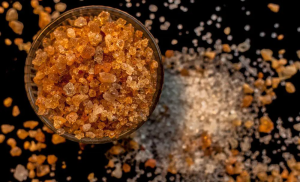Introduction
In the world of natural remedies and holistic healing, few herbs hold the revered status that Tulsi, also known as Holy Basil, enjoys. This sacred plant, native to the Indian subcontinent, has been cherished for centuries in Ayurveda for its profound medicinal properties and spiritual significance. Tulsi referred to as the “Queen of Herbs” for its wide-ranging therapeutic potential. In this comprehensive guide, we embark on a journey to explore the extraordinary medicinal properties of Tulsi, unveiling the secrets of this botanical marvel.
Antioxidant Powerhouse
If you think of Tulsi medicinal uses, one of the most remarkable aspects of Tulsi’s medicinal profile is its potent antioxidant properties. Tulsi is rich in a variety of antioxidants, including flavonoids, polyphenols, and essential oils. These antioxidants play a vital role in neutralizing harmful free radicals in the body. Free radicals are unstable molecules that might damage cells, proteins, and DNA, contributing to various chronic diseases and accelerating the aging process.
By incorporating Tulsi into your daily routine, whether through Tulsi tea, supplements, or culinary use, you can enhance your body’s defense against oxidative stress. This can result in a range of health benefits, including improved skin health, reduced risk of chronic diseases, and a boost to overall well-being.
Immune System Booster
In Ayurveda, Tulsi is celebrated for its immunomodulatory properties. It acts as a natural booster fro immune system, helping the body ward off infections and diseases. Tulsi stimulates the production of immune cells, the T cells and natural killer cells, which are vital for immune defense.
Regular consumption of Tulsi can enhance your immune response, making your body more resilient to infections. This is particularly valuable in today’s world, where maintaining a strong immune system is crucial for preventing and managing various health issues, including viral infections.
Stress Management and Adaptogen
Modern life is often accompanied by stress and its severe effects on both mental and physical health. Tulsi is recognized as an adaptogen—an herb that helps the body to reduce stress and maintain balance. It exerts a calming influence on the nervous system, which reduces the production of stress hormones like cortisol.
Incorporating Tulsi into your daily routine, whether through Tulsi tea or supplements, can be an effective way to manage stress and promote relaxation. This can lead to improves mental clarity, reduces anxiety, and enhanced overall well-being. Tulsi’s adaptogenic properties make it a valuable ally in today’s fast-paced world.
Anti-Inflammatory Agent
Chronic inflammation is at the root of many modern health issues, including heart disease, arthritis, and diabetes. Tulsi possesses significant anti-inflammatory properties, thanks to its high content of compounds like eugenol, ursolic acid, and ocimumosides. These compounds help reduce inflammation in the body and alleviate related symptoms.
Incorporating Tulsi into your diet can be especially beneficial if you suffer from inflammatory conditions. Whether in the form of Tulsi supplements or culinary use, it can help manage pain, improve joint health, and reduce the risk of chronic diseases associated with inflammation.
Cardiovascular Health
Tulsi has a positive impact on cardiovascular health, making it a valuable ally in preventing heart disease. It can help lower high blood pressure by acting as a natural diuretic and vasodilator, promoting relaxation of blood vessels. Additionally, Tulsi improves lipid profiles by reducing levels of harmful LDL cholesterol and triglycerides.
By supporting heart health, Tulsi contributes to a reduced risk of stroke, heart disease, and other cardiovascular issues. Including Tulsi in your daily routine can be an excellent preventive measure for maintaining a healthy heart.
Respiratory Wellness
Tulsi has been used for centuries to address respiratory issues. Its natural decongestant properties make it effective in alleviating symptoms of respiratory conditions like asthma, bronchitis, and allergies. Tulsi’s antimicrobial and anti-inflammatory effects help clear airways and provide relief from congestion.
To reap the respiratory benefits of Tulsi, you can consume Tulsi tea, inhale its steam, or use Tulsi-infused products designed for respiratory health. It’s a natural and holistic approach to maintaining healthy lungs and air passages.
Digestive Aid
A healthy digestive system is important for overall well-being. Tulsi can aid digestion by promoting the production of digestive enzymes and soothing the gastrointestinal tract. It is particularly helpful in alleviating indigestion, bloating, and gas.
Tulsi tea or supplements can be incorporated into your daily routine to support digestive wellness. Additionally, using Tulsi in culinary preparations can add flavor and digestive benefits to your meals.
Antimicrobial and Antibacterial
Tulsi possesses powerful antimicrobial and antibacterial properties, making it effective against a wide range of pathogens. It can help combat bacterial infections, fungal overgrowth, and even viruses. Tulsi’s antimicrobial effects extend to the oral cavity, making it a valuable ingredient in natural oral care products.
By incorporating Tulsi into your diet or oral hygiene routine, you can enhance your body’s defenses against infections. Tulsi-infused mouthwashes or toothpaste can help maintain oral health and prevent issues like bad breath and gum disease.
Uses of Tulsi for Common Health Problems
Respiratory Issues (Cough, Cold, Asthma)
Tulsi is renowned for its respiratory benefits. It can help alleviate symptoms of cough, cold, and asthma.
How to Use:
Tulsi Tea: Prepare Tulsi tea by steeping fresh Tulsi leaves or dried Tulsi leaves in hot water. Add honey and ginger for added relief. Drink this tea 2-3 times a day.
Steam Inhalation: Boil water with Tulsi leaves and inhale the steam. This can help clear congestion and soothe irritated airways.
Tulsi and Honey: Mix Tulsi juice with honey and consume it regularly to soothe a sore throat.
Stress and Anxiety
Tulsi is an adaptogen, which helps the body adapt to stress and reduces anxiety.
How to Use:
Tulsi Tea: Sip on Tulsi tea throughout the day to stay calm and reduce stress.
Tulsi Essential Oil: Inhale the aroma of Tulsi essential oil or use it in aromatherapy diffusers to promote relaxation.
Chewing Tulsi Leaves: Simply chewing fresh Tulsi leaves can have a calming effect.
Skin Issues (Acne, Eczema, Skin Infections)
Tulsi has antimicrobial and anti-inflammatory properties that make it effective for various skin issues.
How to Use:
Tulsi Paste: Crush Tulsi leaves to make a paste. Apply it to the affected area for relief from itching and inflammation.
Tulsi Face Mask: Mix Tulsi paste with yogurt and apply it as a face mask to combat acne and improve skin complexion.
Tulsi Infused Oil: Prepare Tulsi-infused coconut oil and apply it to soothe skin irritations.
Digestive Problems (Indigestion, Gas, Bloating)
Tulsi can aid digestion and relieve common gastrointestinal issues.
How to Use:
Tulsi Tea: Drinking Tulsi tea after meals can promote digestion and alleviate indigestion.
Tulsi and Ginger: Combine Tulsi leaves with ginger to make a digestive tonic that helps reduce gas and bloating.
Tulsi Churna: Make Tulsi churna by drying and powdering Tulsi leaves. Consuming a pinch of this churna with warm water can aid digestion.
Headaches
Tulsi’s analgesic properties make it useful for relieving headaches.
How to Use:
Tulsi Tea: Drink Tulsi tea with a dash of lemon juice to alleviate headaches.
Tulsi Oil Massage: Gently massage Tulsi-infused oil onto your forehead for headache relief.
Fever
Tulsi has antipyretic properties that can help reduce fever.
How to Use:
Tulsi Decoction: Boil Tulsi leaves with water to create a decoction. Drink it to lower fever and boost immunity.
Oral Health (Bad Breath, Gum Disease)
Tulsi’s antimicrobial properties make it effective for maintaining oral hygiene.
How to Use:
Tulsi Mouthwash: Prepare a Tulsi mouthwash by boiling Tulsi leaves in water. Use it as a mouth rinse to combat bad breath and prevent gum disease.
Tulsi Toothpaste: Some natural toothpaste brands incorporate Tulsi as an ingredient.
Insect Bites and Stings
Tulsi can provide relief from the itching and inflammation caused by insect bites and stings.
How to Use:
Tulsi Paste: Apply crushed Tulsi leaves as a paste on the affected area to soothe itching and reduce inflammation.
Joint Pain and Arthritis
Tulsi’s anti-inflammatory properties may help reduce joint pain.
How to Use:
Tulsi Oil Massage: Warm Tulsi-infused oil and massage it onto sore joints for relief.
Immune System Support
Tulsi is an excellent immune booster and can help prevent common illnesses.
How to Use:
Tulsi Tea: Regularly consume Tulsi tea to strengthen your immune system.
Tulsi Supplements: Consider Tulsi supplements for long-term immune support.
Remember that while Tulsi is generally safe, it may interact with certain medications or have contraindications for specific medical conditions. However, it’s essential to ensure that the Tulsi you use is free from pesticides and contaminants for optimal health benefits.
Conclusion
Tulsi, the “Queen of Herbs,” is a botanical marvel with a multitude of medicinal properties that have been cherished for centuries. Whether you seek to boost your immune system, manage stress, reduce inflammation, support heart health, or address respiratory and digestive issues, Tulsi offers a natural and holistic solution. Its adaptogenic qualities make it especially relevant in today’s fast-paced world, where stress is prevalent.
Incorporating Tulsi into your daily routine can be as simple as enjoying a cup of Tulsi tea or adding fresh Tulsi leaves to your salads and dishes. Alternatively, Tulsi supplements and skincare products offer convenient ways to harness its medicinal benefits.
As with any herbal remedy, it’s essential to consult with a healthcare professional before adding Tulsi to your routine, especially if you have specific health concerns or are taking medications. When used wisely, Tulsi can be a powerful ally in promoting your overall health and well-being, aligning with the ancient wisdom of Ayurveda in our modern world.





